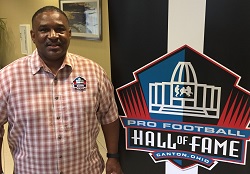By: Urology Care Foundation | Posted on: 01 Sep 2018

September is Prostate Cancer Awareness Month. To raise awareness about this disease we spoke with prostate cancer survivor Keith Harring to learn about and share his journey with the disease. You can also listen to this interview as part of our Urology Care Podcast.
Interviewer: Tell us about yourself.
Keith: My name is Keith Harring. I'm from Massillon, Ohio. My Prostate Cancer story goes back to my great grandfather, my grandfather, my father, and then, myself. My father was diagnosed with prostate cancer. At age 45, I had a screening, and I get a phone call on a Monday...I'll never forget this day. I referee college basketball for the NCAA. And I was on the way to Bowling Green University when I got the call. I answer it and the doctor told me to pull over.
Interviewer: You were literally in the car, driving to go referee a big time NCAA basketball game and you got the call?
Keith: Yes. On the turnpike. I got a chance to pull over and he said, "We need to do a biopsy." About three days after the biopsy, he called me and said, "I want you to come in and bring your wife." By this time, I'm sweating a little bit. This was probably three weeks before Christmas. And he said, "We found some cancer on the left side and we need to take care of this."
My exact words to him were, "How long do I got?" And he said, "Well, no, it's not like that. We think we found it in time. You have a slow grade of cancer. With your history, of your father having prostate cancer, your grandfathers, your great, great grandfather... we probably need to take care of this." I looked at my wife and said, "I don't want my kids' Christmas ruined. I don't want them to know about this until after Christmas." So, kind of an emotional issue...
Interviewer: How old were your kids?
Keith: 17 and 12.
Interviewer: How old were you?
Keith: I was 45, which is rare for this particular thing, the doctors told me. So, I didn't want anybody really staring at me during Christmas. And I didn't really tell anybody until after the first of the new year. So, I go in to see my surgeon in December and he said, "The earliest we can get you in is April." And I said, "April? That's like four months away." He said, "You're okay. It's not moving fast enough and nothing's going to spread. Everything's in the capsule. We think this is going to be successful."
Long story short, we get to April and they do the surgery. When I wake up afterwards, he tells me, "Everything was in the capsule, we got everything, no chemo, no radiation, anything after that. We're just going to monitor you."
Today I'm 13 years out from surgery without any problems, no return, and no signs of it returning. It's amazing how many men don't get checked for prostate cancer. They won't even have a blood test or anything done.
Interviewer: How do you feel?
Keith: I feel great. I'm in good health, other than being a little chubby [he laughs], but I'm in great health. I feel good, and my message always to any men I see, be it athletes or somebody on the street, is that you need to get your prostate checked. Don't mess around. Get this done.
Interviewer: Tell me about your support system. Who was there for you during that difficult time? How did you get through it emotionally?
Keith: Well, after I had the test done and the surgery done, my family was there. My wife, my kids. My kids, were real troopers. They handled it like it was nothing. So now, at this point, my son, who's 28 years old is very much aware that probably in two years, he's going to start to get checked.
In my family, there have probably been 15 cases of prostate cancer. So, as the doctor told us, there's a bad gene in the family somewhere. My father came from a family of eight boys. And from what we understand, all eight of those men had prostate cancer. And now, their sons all get checked, and some are very lucky and haven't had anything. At this point in my life, the message to guys out there is get your yearly checkup and don't be afraid.
Interviewer: Talk to your doctor. There's no downside about bringing it up to your doctor, you know?
Keith: Yeah. And most doctors are doing a pretty good job now of saying, "Hey, we need to get you screened, we better get your blood test checked, your PSA."
Interviewer: Get the conversation going.
Keith: Yeah. Because if you don't...I remember in my job, I talked to a guy that I worked with and his brother had had prostate cancer and he'd never been checked. And he was 60 years old.
Interviewer: When you got the call from your doctor on the night you were supposed to referee a game, did you end up working the game?
Keith: I reffed the game. Hey, you know, the show must go on. And you know what? In the back of my mind, I knew there was something wrong. But, once you hit the court, you have to do your job. But then, coming back home, on that three-hour ride, there's a whole lot of things going through your head. So, I knew I had that appointment with the doctor in a couple of days afterward, and it is what it is. If you get checked out, if they find it, they can handle it. The earlier, the better.
Interviewer: I've run into Keith a few times. He's a great guy and always seems to have a positive outlook on things. Is that a direct result of surviving prostate cancer, or have you always been like that?
Keith: You know, I have to say, my faith is one of the things that helped. Being a Christian, you asked me who my support group was.
Interviewer: That's part of your support system?
Keith: That's my support system. And I've kind of been an advocate indirectly for the NFL and Know Your Stats. I wear my blue bracelet, rubber bracelet, around as much as I can to promote awareness. I remember several years ago, they gave me a bag of them, so I passed them around.
Interviewer: It's such an important message to get across.
Keith: There's all kinds of things out there to be aware of, and watching your diet, and all those things are important. Those are the things your doctor will talk to you about. But I really emphasize, the Know Your Stats website.
Interviewer: Knowyourstats.org.
Keith: And learn, get some information there, and talk to your doctor. There are more people out there than you think that have had this surgery. When I went to the doctor's office in the Cleveland Clinic, there were three guys from my hometown sitting in the waiting room. We all live an hour away from Cleveland and we're all looking at each other. I said, "What are you doing here?" He said, "I just had prostate cancer surgery." I said, "You're kidding me."
So, you know, I just talked to those guys a little bit. They were older than me and they told me what the surgery was going to detail and what the rehab and recovery was, so I had great support all through this thing.
Interviewer: Keith, thank you so much for sharing your prostate cancer journey with us.
Keith: I appreciate you asking me to share my story.
Interviewer: Thanks again, Keith.
Visit our 2018 Prostate Cancer Awareness Month Info Center to learn more.
Explore Further
Share Your Story
Have a story to share? The Urology Care Foundation invites you to share your experience with a urologic condition and how it has affected you or your family.
Make a Differnece
Your tax-deductible gift will help support the millions of patients who are faced with urologic disease. Together, we care.



